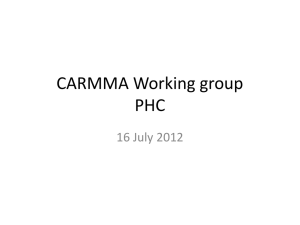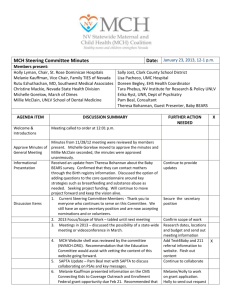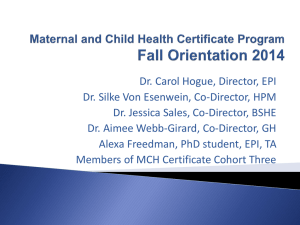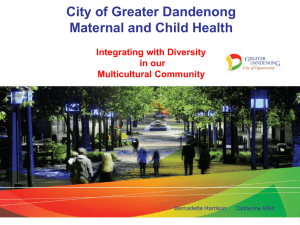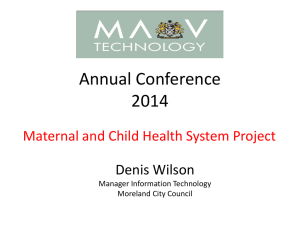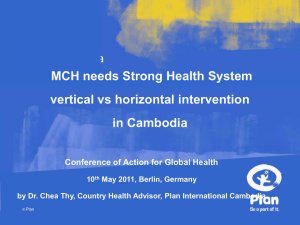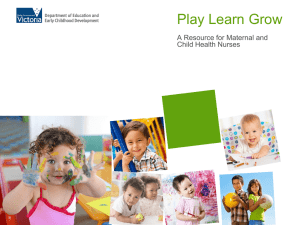Case study-Training Health Care Workers as MNCH Champions
advertisement
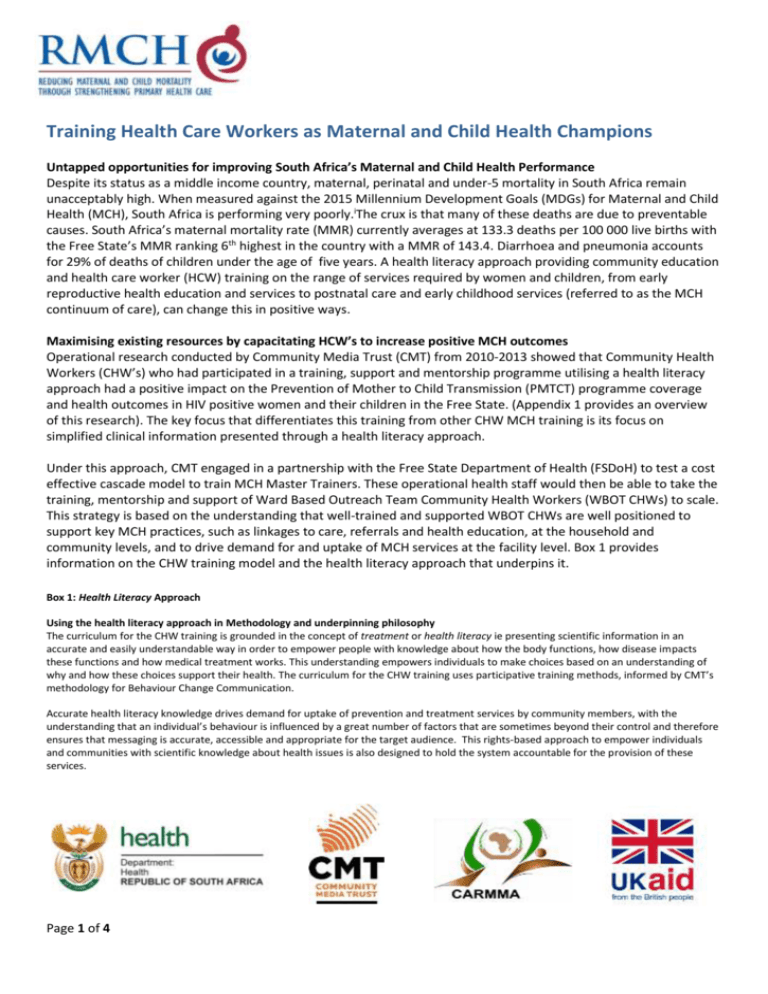
Training Health Care Workers as Maternal and Child Health Champions Untapped opportunities for improving South Africa’s Maternal and Child Health Performance Despite its status as a middle income country, maternal, perinatal and under-5 mortality in South Africa remain unacceptably high. When measured against the 2015 Millennium Development Goals (MDGs) for Maternal and Child Health (MCH), South Africa is performing very poorly.iThe crux is that many of these deaths are due to preventable causes. South Africa’s maternal mortality rate (MMR) currently averages at 133.3 deaths per 100 000 live births with the Free State’s MMR ranking 6th highest in the country with a MMR of 143.4. Diarrhoea and pneumonia accounts for 29% of deaths of children under the age of five years. A health literacy approach providing community education and health care worker (HCW) training on the range of services required by women and children, from early reproductive health education and services to postnatal care and early childhood services (referred to as the MCH continuum of care), can change this in positive ways. Maximising existing resources by capacitating HCW’s to increase positive MCH outcomes Operational research conducted by Community Media Trust (CMT) from 2010-2013 showed that Community Health Workers (CHW’s) who had participated in a training, support and mentorship programme utilising a health literacy approach had a positive impact on the Prevention of Mother to Child Transmission (PMTCT) programme coverage and health outcomes in HIV positive women and their children in the Free State. (Appendix 1 provides an overview of this research). The key focus that differentiates this training from other CHW MCH training is its focus on simplified clinical information presented through a health literacy approach. Under this approach, CMT engaged in a partnership with the Free State Department of Health (FSDoH) to test a cost effective cascade model to train MCH Master Trainers. These operational health staff would then be able to take the training, mentorship and support of Ward Based Outreach Team Community Health Workers (WBOT CHWs) to scale. This strategy is based on the understanding that well-trained and supported WBOT CHWs are well positioned to support key MCH practices, such as linkages to care, referrals and health education, at the household and community levels, and to drive demand for and uptake of MCH services at the facility level. Box 1 provides information on the CHW training model and the health literacy approach that underpins it. Box 1: Health Literacy Approach Using the health literacy approach in Methodology and underpinning philosophy The curriculum for the CHW training is grounded in the concept of treatment or health literacy ie presenting scientific information in an accurate and easily understandable way in order to empower people with knowledge about how the body functions, how disease impacts these functions and how medical treatment works. This understanding empowers individuals to make choices based on an understanding of why and how these choices support their health. The curriculum for the CHW training uses participative training methods, informed by CMT’s methodology for Behaviour Change Communication. Accurate health literacy knowledge drives demand for uptake of prevention and treatment services by community members, with the understanding that an individual’s behaviour is influenced by a great number of factors that are sometimes beyond their control and therefore ensures that messaging is accurate, accessible and appropriate for the target audience. This rights-based approach to empower individuals and communities with scientific knowledge about health issues is also designed to hold the system accountable for the provision of these services. Page 1 of 4 Consultation with key members of the District Health Teams (DHTs) in each of the five districts of the Free State led to a shift from a MCH Master Training programme to the training of MCH Champions. A master training programme requires health care personnel with a dedicated training role and background, who were few in number. The focus therefore shifted to training various categories of more available health care workers as MCH Champions using an adaptation of the CHW training model. The Role of MCH Champions: Increasing MCH service demand and accountability MCH Champions can increase MCH service demand and accountability through: Creating awareness of the Millennium Development Goals for improved MCH outcomes Educating various categories of staff on clinical content relevant to the MCH continuum of care (CoC) and package of services Raising awareness of opportunities for various categories of staff to contribute to improved MCH outcomes in their daily tasks by linking these to the MCH continuum of care Taking action in their daily work to identify and fill gaps in knowledge for integrated MCH care with updated information on current policies and treatment guidelines Increasing service responsiveness to the health needs of women and children, including integration of services Raising awareness of how health care workers can support each other and the role that CHW’s can play in addressing South Africa’s high level of preventable maternal and child deaths HCW’s experiences and application of the MCH Champions training in two Free State Districts A total of 64 health care workers, identified by the District Health Teams in Fezile Dabi and Thabo Mofutsanyane, participated in an initial five-day MCH Champions training workshop in December 2013. Regional Training Centre (RTC) representatives participated in the training in both districts. Each district identified different categories of HCW’s to participate in the training and ensured that the same participants returned for an additional 5-day follow up training eight months later. Fezile Dabi participants Enrolled Nurses, Health Promoters, Community Development Practitioners and WBOT Outreach Team Leaders (OTLs) Thabo Mofutsanyane participants Professional Nurses, , Integrated School Health Programme Coordinators, Health Promoters, Facility Managers and WBOT OTLs What participants had to say about the training: Participants found the health literacy informed training to be of high value: “…it was super, I am a nurse and have been to many trainings but it has never been so simplified.” “Lucky to have people able to disseminate information so correctly” – Outreach Team Leader “Training sessions were an eye opener, interesting and relevant to all levels” - Team leader The use of a health literacy approach helped to address gaps in the clinical knowledge and increased participants’ sense of confidence: “As a professional nurse there were aspects of this training that I was trained on before that had not been easy for me to understand but for first time I felt confident enough to teach it to others” Participants found the training directly useful for implementation/ service delivery: “Helped me a lot because working with community, I do school health so it is now easy for me to explain when kids ask questions. Really, really helped me because we have a crisis of teen pregnancy.” - Health Promoter “Trying to implement as we were taught, increasing morale of CHW’s and team leaders and showing that enablers are there.” - Team Leader Page 2 of 4 Topics that participants found most useful in the initial training: Understanding the human body and immune system (noted by most participants) Breastfeeding (noted by most participants) Family planning, PMTCT HPV, TB screening and HIV Counselling and Testing (HCT) Antenatal care and the dangers of (pregnant women) booking late at the clinic Identifying danger signs in pregnant women and women who have just delivered and babies Immunisation The lifecycle of HIV and the medical interventions for the virus The difference between the viral load and the CD4 count Sero-conversion and ART – how ARVs work Causes of maternal and neo-natal deaths MDG’s 4- reducing child mortality, 5-improving maternal health and 6 – combatting HIV and other diseases impacting MCH outcomes Participants reported using the initial training to shift demand and accountability as follows: To impact the willingness of pregnant women to test for HIV, “know more about PMTCT” and lower the treatment defaulting rate, attend early antenatal care, delivery at hospitals, and use of Fixed Dose Combination (FDC) at an early stage if they are HIV positive To improve the quality of their health education with clients To share information from OTLs to CHW’s and other health professionals Health Promoters used the training to inform their community dialogues and awareness days such as Pregnancy Week Health Care Workers were more able to “identify danger signs so that we can fast track a patient” Establishment of support groups for HIV positive clients in the clinic setting Education/ information sharing for CHW’s and clients on how the ARVs work to prevent HIV from multiplying. This was said to impact positively on adherence and treatment. Meetings with Traditional Health Practitioners for information sharing and education relating to MCH care practices Nutrition and breastfeeding outreach campaigns attended by occupational therapist, dietician, Professional nurses, Medical Officers, Health Promotion Practitioners, Community Development Practitioners, Oral health and WBOT CHWs Informed health education in schools Training of colleagues Formation of breastfeeding support groups Health education to community members – individual sessions in clinics and door-to-door visits This feedback indicates that participants felt more competent to engage with MCH needs and to capacitate others after the initial training. Further research is needed to establish impact on demand and accountability, its translation into systems strengthening and MCH outcomes. Lessons learned from implementation Regional Training Centres (RTC’s) have a key role in systemically strengthening the capacity of health service providers to champion the cause of improved MCH outcomes Scaling up programmes through cascaded training requires sufficient cadres with a dedicated training role who are few in number in the health system OTL’s are well positioned for cascading/ capacitating, supervising, mentoring and creating supportive environments for key health staff such as CHW’s, enrolled nurses (EN’s) and auxiliary nurses to contribute to improved MCH outcomes Training various categories of staff together strengthens integration and teamwork and creates built in support systems for MCH services Interpretations of appropriate candidates for MCH Champions varies amongst districts Page 3 of 4 District re-structuring during the training programme removed key drivers supporting the training planning and implementation. Participants used the training for re-orienting themselves to the role of an MCH Champion within their new jobs following district restructuring. Agreement at the outset of the training that adult learning principles will inform the learning process ensures the sharing of participant’s expertise and experience, rather than just a reliance on facilitator knowledge. Participants used the training space to share their practices for addressing challenges. Examples include dealing with cultural barriers to MCH care within the communities where they work and facilitation of intra and inter-sectoral collaboration in areas where the institutional spaces set up for this such as War Rooms are not fully operational. Key recommendations For Regional Training Centres using this training information: Use local MCH performance data (District Dashboards) to highlight the relevance of the training content by linking content to district-specific performance / challenges Focus the curriculum on MCH clinical content to up-skill participants Draw on peer learning opportunities in the training to encourage application of the learning in everyday tasks that link into the MCH continuum of care Identify the points of care at which various categories of health staff can contribute to improved MCH outcomes and aim to maximise these opportunities through ongoing training, mentorship and support For District Health Teams: Information from training can be shared in multiple ways – for example Outreach Team Leaders are key personnel to cascade knowledge during their daily work - both in terms of the Re-engineering Primary Health Care (R-PHC) systems, policy, tools etc. and the clinical content focusing on MCH. Enrolled Nurses can also share knowledge gained with Professional Nurses Current policy and R-PHC implementation plans need to pay attention to health system orientation to PHC and “enablers” for MCH outreach work and its systematic integration A means of formal communication between facility and outreach services is urgently required to facilitate follow-up of referrals and continuation of care for MCH The case study aims to show the potential to maximise opportunities for addressing MCH outcomes amongst all categories of HCW’s. Thus lessons and recommendations will be of particular value to RTC’s and district health teams, particularly programme managers, responsible for services relating to the MCH continuum of care and package of services. This case study been developed in support of the Reducing Maternal and Child Mortality through Strengthening Primary Health Care in South Africa Programme (RMCH). The RMCH programme is implemented by GRM Futures Group in partnership with Health Systems Trust, Save the Children South Africa and Social Development Direct, with funding from the UK Government. The views expressed do not necessarily reflect the UK Government’s official policies. All reasonable precautions have been taken to verify the information contained in this publication. RMCH is committed to helping reduce the high number of avoidable maternal and child deaths in South Africa by strengthening the primary health care system. The programme provides technical assistance to the South African National Department of Health (NDoH) and the Districts to improve the quality of, and access to, reproductive, maternal and child health services for women and children living in poorer, underserved areas in South Africa. iDepartment of Health. 2012. South Africa’s National Strategic Plan for a Campaign on Accelerated Reduction of Maternal and Child Mortality in Africa (CARMMA). Page 4 of 4
